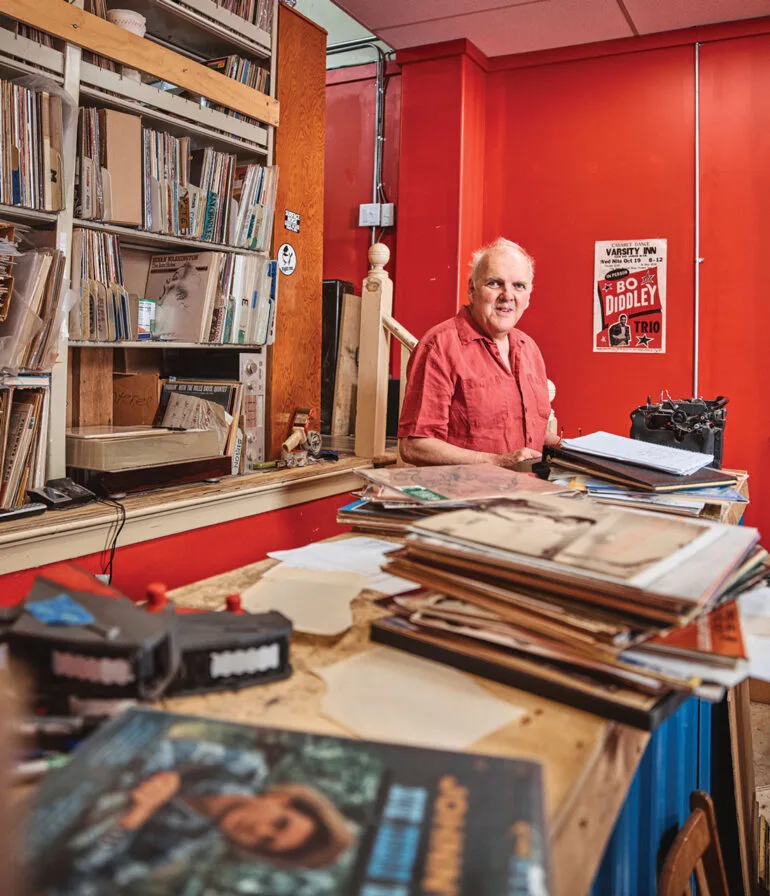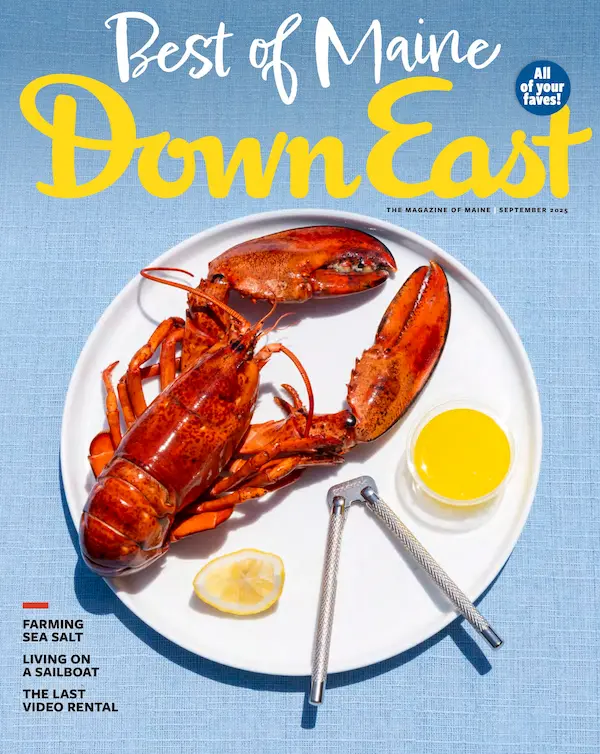By Kaitlyn Schwalje
Photos by Michael D. Wilson
From our September 2025 issue
Bob Wirtz recounts snippets of the moment, in 1986, when the trajectory of his life changed forever. “I can flip a switch and it’s like a videotape,” he says. Slushy winter streets. A tan Buick station wagon careening toward him. Distant sirens. Blood-soaked ice. Pressure from a stranger cinching a makeshift tourniquet. Two years and 25 surgeries later, he elected to have his leg amputated just below the knee — and to abandon his career selling used furniture and open a record shop instead.
Almost 40 years later, Enterprise Records occupies its sixth incarnation, at the intersection of Pine and Winter streets, sandwiched between one of Portland’s newest barbershops and its oldest gay bar. A quote attributed to Winston Churchill, taped on the shop’s lipstick-red walls, above a section of British and Celtic folk music, characterizes the series of events that led to Wirtz’s life’s work: “Fate turns on small hinges.”
The secret to Enterprise Records’s longevity lies in a devoted clientele but also a little luck. In the late ’80s, as sales of records were plummeting, overtaken by compact discs, Wirtz found an unlikely safety net: a shop owner in South Korea who started requesting periodic shipments of records in batches of 20,000. The guy would take anything, in any condition. The transactions were essentially “money for old rope,” Wirtz says. Some years later, he developed a similar arrangement with a Brazilian businessman, Zero Freitas, now widely believed to own the world’s largest collection, some eight million records. Wirtz estimates half a million of those came from him, but he’s quick to challenge calling it a collection. “It’s more of a pile,” he says.
The shipments to Korea carried on for a decade and paid Enterprise Records’s rent until domestic interest in records began bouncing back. To this day, Wirtz stays mum about how he sourced so many records, and his general inclination is to choose his words carefully. For starters, it’s records, not vinyl. Vinyl, in his opinion, refers to shower curtains, clapboard siding, and raincoats. He once considered, and then abandoned, an idea for an art installation to illustrate the point: two towering piles, one of records and one of other vinyl things, in opposite corners of the store. He also emphasizes the distinction between rare and valuable. Valuable means expensive, whereas rare means some guy in Cleveland with a piano bar pressed a handful of copies of a performance. Wirtz’s role as music matchmaker is clearly what matters to him most. Making money is incidental to making fresh sounds available to receptive ears.








One recent afternoon, standing behind a raised counter at the back of his shop, Wirtz pulled from unsorted stacks of inventory with the precise recall of a mnemonic wiz reciting the first thousand digits of pi: some Miles Davis here, the Vatican recordings of the last castrato there. He’s constantly DJing for a rotating cast of neighborhood eccentrics, serious collectors, binge buyers, and tourists (categories of people that aren’t mutually exclusive). When he dropped the needle on the latest album from a tribal-bass duo out of Germany, the sound was a rhythmic wobble backed by high-pitched Japanese vocals. Wirtz and his customers exchanged amused looks. His stacks and shelves include plenty of crowd-pleasers — The Beatles, Billie Holiday, George Carlin standup, James Bond soundtracks — but Wirtz gets his kicks spinning whatever esoterica he’s acquired most recently. After a few tracks, he switched to a ’70s punk band out of San Francisco. A female voice roared through the store: “I’m ready for a brand-new race / one concerned with the way you move / not the arrangement of your face.” A woman made a beeline for Wirtz’s podium and claimed the record.
People whose sensibilities lean more mainstream, though, are just as welcome. Wirtz insists that the snobbish record-shop owner John Cusack played in High Fidelity is more of a tired cliché than a reality. At least based on what he saw of the movie — he walked out of the theater before it was over. Unlike Cusack’s character, Wirtz doesn’t judge customers’ tastes in music. But if you happen to have bad taste, he adds with a wink, “All purchases here are strictly confidential.”




